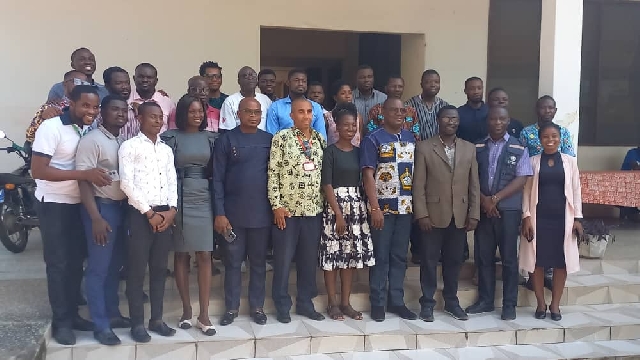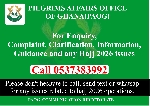Experts say urgent action needed on anti-microbial resistance threat
 Participants at the workshop
Participants at the workshop
Prof Kwame Ohene Buabeng, the Dean of the School of Pharmacy at the University of Health and Allied Sciences (UHAS) in the Volta Region, has emphasised the severity of Anti-microbial Resistance (AMR) as a significant public health threat, requiring immediate attention from all stakeholders.
Prof Buabeng, a Clinical Pharmacologist, stressed that AMR poses a global public health threat, as declared by the World Health Organization (WHO), and is silently becoming a pandemic, making it increasingly challenging to treat infections in many health facilities.
Speaking during a two-day training workshop in Ho for media professionals in the Volta Region on Anti-microbial Resistance (AMR), Prof Buabeng explained that the situation has reached a point where health professionals struggle to treat infections with antibiotics, and the problem is projected to cause about 10 million deaths by 2050.
Mr Godfred Saviour K. Azaglo, a Senior Policy Officer at the Environmental Protection Agency (EPA) Head Office, emphasized the importance of environmental care in reducing AMR.
He highlighted that AMR is present in the air, industrial wastewater, municipal wastewater, soil, and vegetables, emphasising the need for conscious efforts to reduce it.
Mr Azaglo recommended adherence to health protocols, including handwashing, to mitigate the risks associated with AMR.
Dr George K. Hedidor of the World Health Organisation (WHO) discussed the Global Action Plan (GAP) endorsed at the sixty-eighth World Health Assembly in 2015 to address the growing problem of anti-microbial resistance.
He noted that Ghana has developed and launched a National AMR Action Plan (NAP) aligned with the GAP and the Food and Agricultural Organisation (FAO) AMR Action Plan.
The Communication Officer of the Food Agriculture Organisation, Mr David Young emphasized the role of the media in raising awareness about AMR and the importance of the World Anti-microbial Awareness Week (WAAW), observed in November every year.
The WAAW 2023 campaign focuses on preventing anti-microbial resistance, calling on stakeholders to recognise their role in being AMR awareness champions.
The experts stressed the urgency of collective efforts to combat AMR, including environmental care, adherence to health protocols, and awareness campaigns through media advocacy.
The media was identified as having a crucial role in fostering policy and social change to address the challenges associated with AMR.
Source: Classfmonline.com/Cecil Mensah
Trending News

Faulty streetlight blamed for fatal accident on Kasoa Highway
16:03
Minority flags election petitions, youth unemployment and third-term agenda as democratic threats
01:07
Togbui Adu Bobi IV urges CMG CEO to invest in Ho FM's annual health walk as hundreds join 6th edition
02:15
NDC extends Christmas and New Year greetings, reaffirms commitment to governance mandate
14:51
PAOG opens dedicated communication lines for Hajj 2026 enquiries
00:55
Dr Opoku accuses Fourth Estate and Sulemana Briamah of misrepresentation in KGL-NLA deal
05:47
Public outcry grows over silence on October 2024 fatal East Legon accident case
13:54
Don't bring back Dr Bawumia - Political Scientist warns NPP delegates
00:28
V/R: Bee attack on Anloga EP Basic School leaves 2 dead
03:14
DVLA suspends rollout of RFID licence plates over legislative delays
12:18




